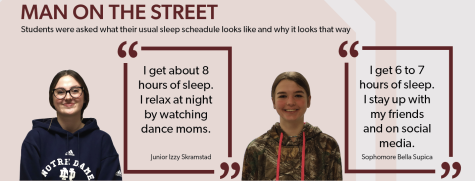Slacking on Sleep
March 20, 2023

Getting enough sleep is a common struggle, but with balancing school, free time, activities and potentially a job, teens have an especially unique challenge in finding the time to get enough rest.
Oftentimes, teens find themselves awake late. According to senior Garrett Cowen, because he is up, he might as well fill his time.
“There’s just a lot more on my mind, so I couldn’t fall asleep anyway,” Cowen said. “So I want to distract myself.”
Junior Noah Johnson relates to this sentiment, with a variety of things that keep him from going to bed: schoolwork, hygiene habits and YouTube. Johnson explains the effects this lack of sleep has on his life.
“I have a lot of brain fog when I don’t sleep and it affects my ability to focus on schoolwork, talk to other people and everything in general,” Johnson said. “My friends also do not get very much sleep and my family, they make fun of me for it, but it’s just kind of a fact of life.”
Freshman Ian Weatherman has similar experiences with sleep to Johnson and Cowen, but differs in the sense that his family wants to help his sleep improve.
“My mom and dad are trying to fix it,” Weatherman said. “My mom has brought it up on my last few doctor visits. She’s asked the doctor how much sleep is healthy as a not so subtle hint to me. They’re trying to help me get more.”
Even with this familial support, Weatherman has struggled to get good amounts of sleep due to schoolwork.
“Some nights I go to bed earlier, but I can never get a consistent schedule with homework variation and all that,” Weatherman said. “It’s usually just working on schoolwork, after school clubs and activities and just wanting to have time by myself after a long day.”
Improving sleep is important, according to Steve Lauer, Associate Chair of the Department of Pediatrics at The University of Kansas Health System. Lauer describes some of the more serious and long-term effects of sleep deprivation.
“Poor sleep habits and sleep deprivation are associated with symptoms of anxiety and depression,” Lauer said. “A tired brain mixed with the social isolation of the pandemic, is much more likely to develop mental health issues than a rested brain. In addition, being tired makes it very difficult to get school work done, adding to the stress and anxiety of adolescence. I frequently tell parents and teens that I can’t tell a tired brain from an ADHD brain. Long term sleep deprivation makes it very challenging for the development of executive function skills to proceed in the right manner, making it eventually more challenging to do well at work or in college.”
Because of a repeated lack of sleep’s bad effects, Lauer encourages teens to find what is right for them while prioritizing their health.
“The real answer is that each person is different and the right answer for a friend may not be the right answer for you,” Lauer said. “You need enough sleep to be able to wake up feeling rested and organized about the new day.”
